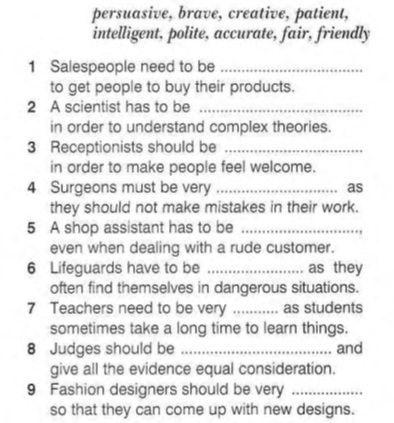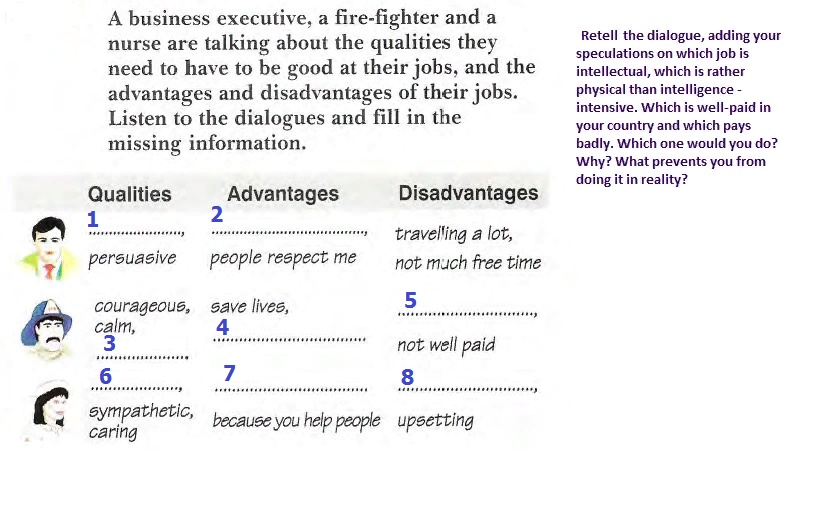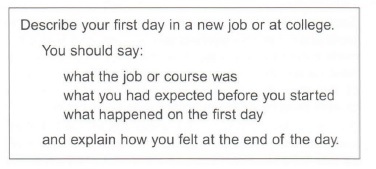|
Attend to this home task every day. Send for a check all tasks that require your own expression. After that you should learn them by heart, make audio files or videos with their recitation. Look straight into the camera when making videos.Day I. 1. Correct your mistakes in the essay you wrote as diagnostics and learn it by heart. Optional: Send in video messages in skype or whatsapp where you recite the essay, looking into the camera. 2. Do the exercises below. You can copy the pics and open them in “Paint”, inserting the necessary words right into the picture. Then send the pictures with saved changes to me for a check in WhatsApp (+79261836651) or Skype (tatyanann1) 3. Fill in the gaps in the task below, then try to form derivatives (однокоренные слова) from the adjectives in italics.
Write an answer to the question, giving grounds: What do you have to be like to succeed in your field? 4. Listen to the audio and do the tasks in the image below. Prepare the retelling in writing and send in for editing. Then tell about your job/ future job. What qualities does it require? What are its advantages and disadvantages?
Day II.1. Retell the video below using as many words and ideas from it as possible. Switch on the subtitles. Put down the most relevant ideas.Send in an audio message summarizing the video.2. Watch the first half of the video below with captions on and put down what the guy tells us about a robotic grocery shop and robotic anesthesiologists.Send in for a check and you will learn it later. You should try to repeat what the guy says with the guy! What point does he make at the beginning of his speech? New tricky words: to spell the end of = положить конец чему-то, exempt from = защищенный от..., AI= artificial intelligence= искуcственный интеллект, to be replaced by= быть замещенным чем-то, a serious concern=серьезная озабоченность, to lead to civil unrest= привести к гражданскому восстанию, to impact smth= сильно воздействовать на..., an ATM=automatic teller machine=банкомат, groceries= бакалейные товары, a conveyor belt, to swipe one's card= провести картой, DHS required microchip implant= требуемый департаментом внутренней безопасности США имплантированный чип, to put to sleep= усыплять, IV =интравенозные катетеры (для подключения пациента к аппаратуре), Nighty night=Спокойной ночи 3. Watch the second half of the video and put down a summary of the speech using the following words:to use smth left and right= использовать что-то направо и налево, human interaction, goods=товары, to change the course of a technocratic grid= изменить направление деятельности технократической системы, to deploy a grid= разворачивать систему /сеть, consumer demand= потребительский спрос, to employ= нанимать, unless= если не.., to make sacrifices=приносить в жертву, liberty=freedom, conveniences=удобства. What does the man call for? Send in for a check. 4. Using words and ideas collected from the previous tasks, write answers to the following questions:Speaking Part 3
Try to use at least 1 idiom from the list!!!
|
 |
Put 'a' next to the attitude that is mentioned and 'b' next to the attitude which is not mentioned. A B C D E F
|
Questions 5-10. Match the epochs and thinkers and attitudes by writing the relevant number in each gap.
A - for Ancient Greece B - for the Middle Ages C - for John Calvin
- people should choose their occupation -
- work gives others freedom to carry out certain non-work activities -
- people should work hard -
- people who earn money should help others financially -
- work gives people a low position in society -
- a person’s occupation should depend on the social position they are born into -
- people should use money they do not need to create more money -
Questions 11-16. Complete the summary below.
Choose NO MORE THAN ONE WORD from the passage for each answer.
Work in the information age
Work is generally expected to be 11 for its own sake.
There is an emphasis on the benefits for the individual, and on the 12 of his or her output. One of the major contributors to the enjoyment of work is. A number of factors, rather than money alone, create In many jobs,workers are able to take of what they do. There has been a significant change in the main16 that are effective in the workplace.
Using the text, prepare a 2-min talk on the following plan:
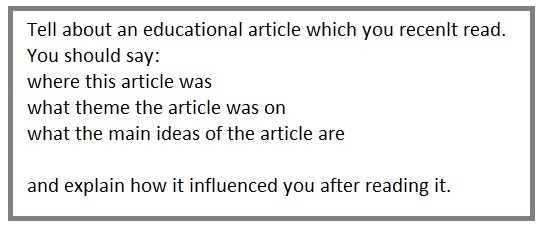
Use the following words:
-
Food for thought: This idiom suggests that the article provides material for thinking deeply and considering new perspectives.
-
Mind-expanding: This phrase conveys that the educational article broadens one's thinking and knowledge.
-
Eye-opener: This idiom indicates that the article brings new insights or revelations, leading to a shift in perspective.
-
Thought-provoking: This phrase implies that the article stimulates thought and contemplation.
Day IV. 1. Prepare #5 on page 127 (in the format of Speaking part 2 in the exam) in WRITING. Send in for a check. You may want to use the video and similar ones as a source of ideas and expressions.
2. Do unit 19 in Objective IELTS work book Check your SB and WB exercises with the TB.
Day V.
1. Read the model writing task 1 answer

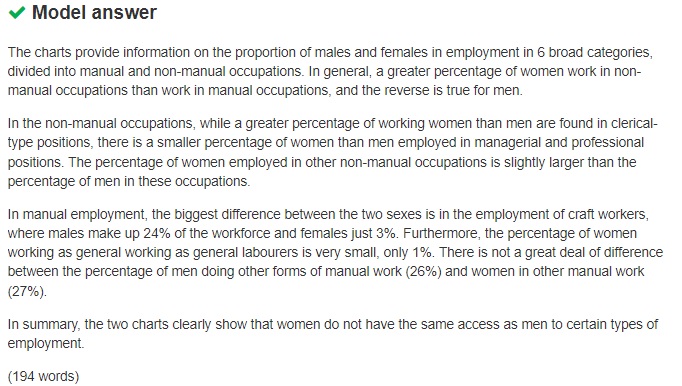
and write the analysis of the pie charts below
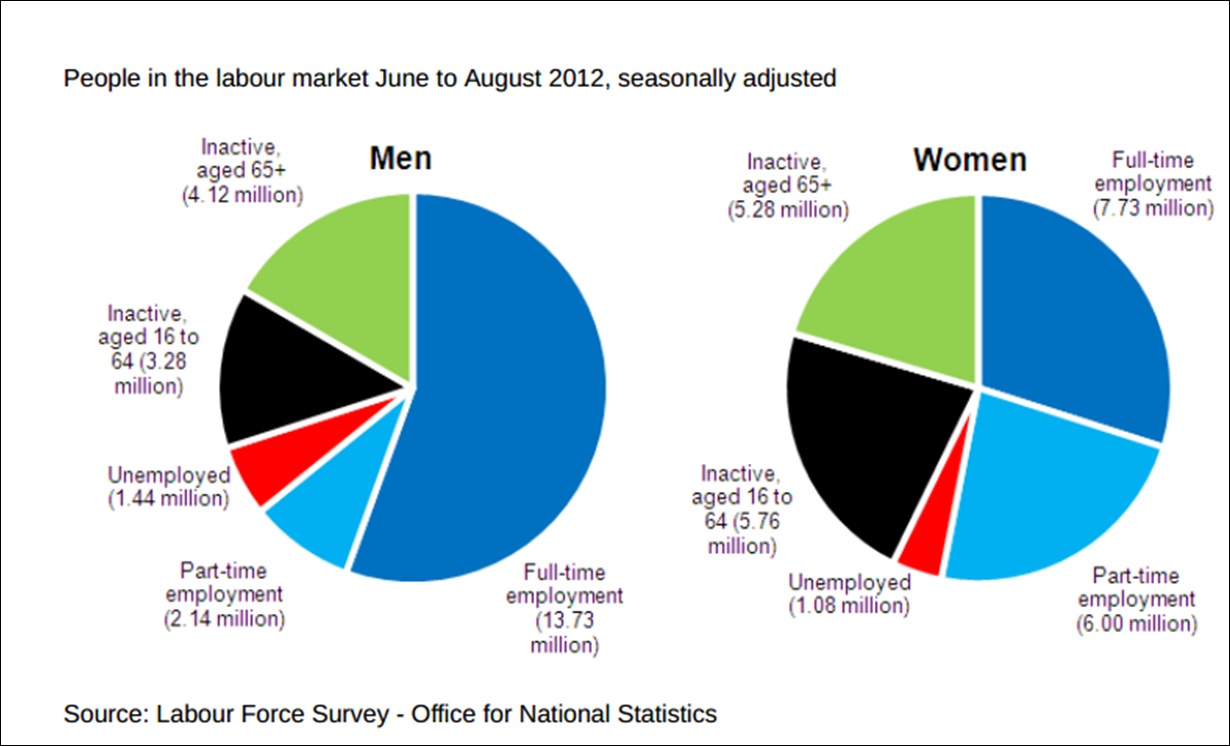
2. Put the words from the list below in the right gaps
Survive Homelessness healthcare trials bullshit citizens vehemently advancements
News is coming out of Europe that Basic Income could become a reality in several countries. Basic income is a policy in which …… get money just for being citizens of that country; they get a monthly check, a statement just for being there, just happen to being there, right? You are paid for existing.
Local authorities across the Netherlands are currently running ………….to award every citizen unconditional money from the state. Now, of course, when we, Americans, hear this, when we’re told of this idea, it makes our protestant work ethic burn. It makes our heads throb …. and we start twitching…………………. It just impacts us: getting money without working. What’s next? An accountable, verifiable voting system? It’s not just how to things are done.
But, in fact, think about this. What is work? Work was initially done so we could …………………... You could, you know, you had to plant food, take care of the farm, take care of the kids and build your house. You had to do that to survive. Then, later, work was done to build things that weren’t necessarily for you, but they were still very important, you know, to the society: building railroads, putting on electricity, growing the society as a whole in various very important ways.
Now, however, with ……………………………….of technologies only a small percentage of work is done to survive or to make something crucial. Instead, a lot of work is moving numbers around on the screen to enrich people or making a new video game or managing some social media or whatever. It’s all……………! Sure, if it’s your passion, have that. If you love social media then do that, that’s great. But if we are all working our asses off for bullshit that we hate, if you hate it, then what kind of life is that? Why are we wasting our existence with that?
Basic income solves that problem. It also solves tons of other problems. You wouldn’t need food stamps for people. …………………would be nearly wiped off the map. People could afford…………………….., which should be free anywhere. Basically, you‘d have a much better society, a better existence. But we, here, in the U.S. won’t even consider this, because capitalism wants people struggling. Capitalism loves people struggling. It needs workers just grabbing for pennies. If you see people on the street, it’s good because you need to feel that. The more desperate workers are the better stocks do. Corporate stocks do well when workers are desperate. That’s how capitalism works.
So, that’s why we can’t process of the idea of Basic Income, but, in fact, it is a great idea. And with technology going away, it what needs the effort, it’s the next step.
Does the text above complement, contradict, or support the video from DayI?
Would you agree not to ever work on condition (при условии что) you are paid some basic income?
How could that influence you?
For the better or for the worse?
Will AI eventually free us from routine and dull work or enslave us?
Day VI.
1. Write an essay on the following topic:
Most people in the world have to work to earn a living. However, many people work only for the financial gain that it involves and not for any other rewards that a job can offer. What do u think the main considerations when deciding what job to take should be.
Use the following layout:
If there happens to be only one question in the heading:
1) Introduction
- Paraphrase the question
- Outline sentence – state your answers to the question in a general way.
2) Main body paragraph 1 – The first point in your answer
- Topic sentence
- Explanation – develop the idea
- Example – give an example
3) Main body paragraph 2 – The second point in your answer
- Topic sentence
- Explanation – develop the idea
- Example – give an example
3) Main body paragraph 2 – The third point in your answer
- Topic sentence
- Explanation – develop the idea
- Example – give an example
4) Conclusion Summarise the question and points in the answer
2. Write the essay on the following topic:
Some people think that eventually robotization of many jobs will make people happier and their life-easier. To what extent do you agree or disagree?
If you happen to find more time, keep doing tasks in this book. It trains your vocabulary related to the exam. For this block you will need to do page 102 down. Check yourself with the answers.
